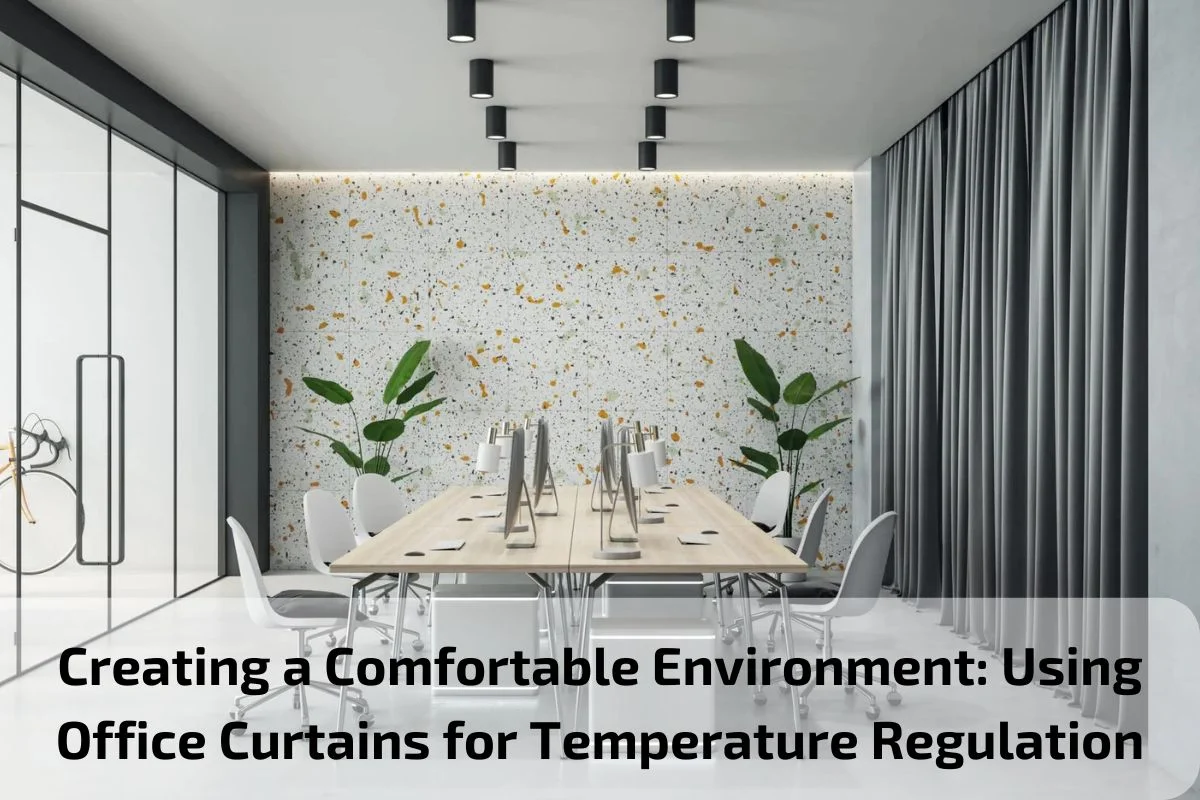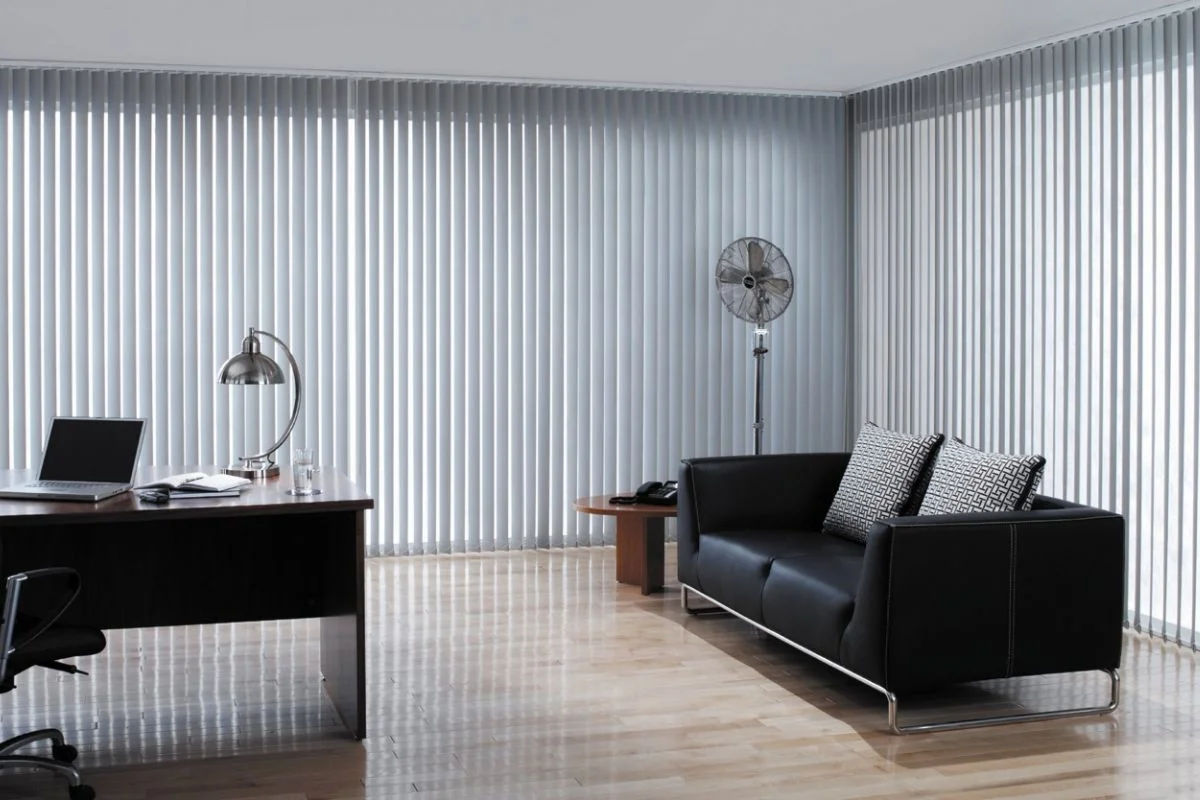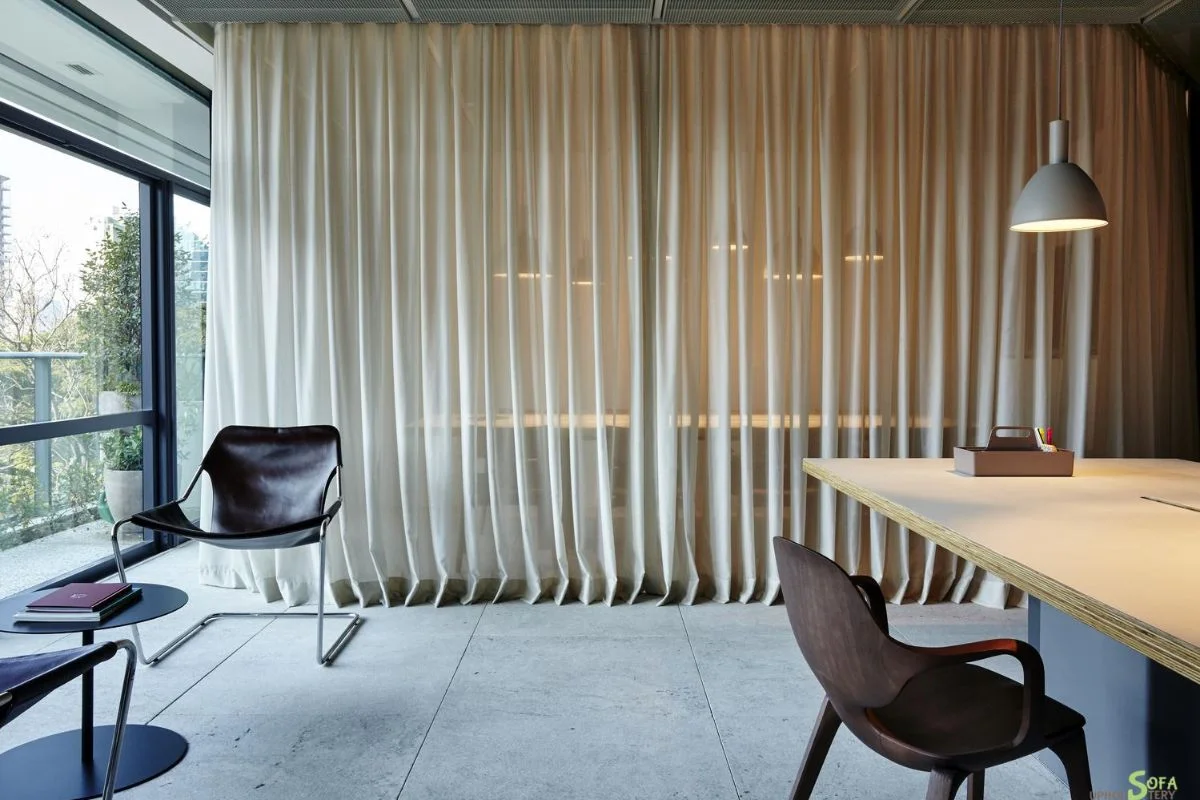
In any office setting, maintaining a comfortable environment is essential for employee productivity, morale, and overall well-being. While factors like lighting, furniture, and layout play significant roles, one often overlooked element is temperature regulation. Office curtains offer a simple yet effective solution for controlling temperature fluctuations and creating a comfortable workspace.
In this article, we’ll explore how office curtains can be used to regulate temperature, ensuring that your office remains conducive to work throughout the year. From blocking out excess sunlight to insulating against cold drafts, office curtains provide versatility and flexibility in managing indoor climate conditions. Let’s delve into the various ways in which office curtains can contribute to a comfortable environment, promoting productivity and enhancing employee satisfaction.
Importance of Office Curtains in Workplace Design
Office curtains play a crucial role in shaping the overall design and functionality of a workplace environment. Here are several reasons why office curtains are important elements in workplace design:
Privacy and Confidentiality: Office curtains provide a layer of privacy for individual workspaces, meeting rooms, and conference areas. They help employees focus on their tasks without distractions and create confidential spaces for sensitive discussions and meetings.
Light Control and Glare Reduction: Properly chosen office curtains can control the amount of natural light entering the workspace, reducing glare on computer screens and minimizing eye strain. Employees can adjust the curtains throughout the day to create a comfortable and conducive working environment.
Temperature Regulation: Office curtains can contribute to temperature regulation within the workspace by blocking drafts and insulating windows. This helps maintain a consistent and comfortable indoor temperature, reducing the need for excessive heating or cooling and improving energy efficiency.
Aesthetic Enhancement: Beyond their functional benefits, office curtains also play a significant role in enhancing the aesthetic appeal of the workplace. Well-chosen curtains can add texture, color, and visual interest to office interiors, reflecting the company’s brand identity and creating a welcoming atmosphere for employees and visitors alike.
Sound Absorption: Certain types of office curtains, such as those made from thicker fabrics or with sound-absorbing properties, can help dampen noise within the workspace. This is particularly beneficial in open-plan office layouts where noise levels can impact employee concentration and productivity.
Flexibility and Versatility: Office curtains offer flexibility in workspace design, allowing for easy reconfiguration of office layouts and partitions as organizational needs change. They provide a cost-effective solution for dividing large spaces, creating temporary meeting areas, or adding decorative accents to office interiors.
Branding and Corporate Identity: Office curtains can be customized to incorporate company logos, colors, and branding elements, reinforcing the organization’s corporate identity and culture. This subtle branding helps create a cohesive and professional environment that aligns with the company’s values and objectives.
Employee Wellbeing and Satisfaction: Creating a comfortable and visually appealing workspace with the help of office curtains contributes to employee satisfaction and wellbeing. Employees are more likely to feel motivated, engaged, and inspired in a well-designed environment that considers their comfort and needs.
Choosing the Right Office Curtains
Selecting the appropriate office curtains involves careful consideration of various factors to ensure they meet the functional and aesthetic requirements of the workspace. Here’s a comprehensive guide to help you choose the right office curtains:
Considerations for Selection: Evaluate the specific needs and requirements of the workspace, including privacy levels, light control, temperature regulation, and acoustic properties.
Style and Design: Choose office curtains that complement the overall design aesthetic and branding of the workplace. Consider factors such as color, pattern, fabric texture, and curtain style to create a cohesive and visually appealing environment.
Functionality: Determine the primary function of the curtains, whether it’s to provide privacy, control light levels, reduce glare, or improve acoustics. Select curtains with features that address these specific functional requirements.
Materials and Fabrics: Select high-quality materials and fabrics that are durable, easy to maintain, and suitable for the intended use. Consider factors such as fabric weight, opacity, and sound-absorbing properties when choosing office curtains.
Light Control Options: Choose office curtains with light control options that allow for flexibility in adjusting natural light levels throughout the day. Options may include sheer curtains for diffused light, blackout curtains for complete darkness, or adjustable blinds for precise control.
Temperature Regulation: Consider office curtains with thermal insulation properties to help regulate indoor temperatures and improve energy efficiency. Insulating curtains can help reduce heating and cooling costs by minimizing heat loss or gain through windows.
Customization and Branding: Explore customization options to incorporate company logos, colors, and branding elements into the design of the office curtains. Customized curtains help reinforce corporate identity and create a professional and cohesive workspace environment.
Ease of Maintenance: Choose office curtains that are easy to clean and maintain to ensure longevity and hygiene in the workplace. Opt for fabrics that are machine washable or can be easily spot cleaned to remove dust, dirt, and stains.
Budget Considerations: Establish a budget for office curtains and explore options that offer the best value for money while meeting functional and aesthetic requirements. Consider long-term savings in energy costs and maintenance when investing in high-quality curtains.
Consultation and Expert Advice: Seek input from interior designers, curtain specialists, or workplace consultants to help guide your decision-making process. Professional advice can help ensure that the selected office curtains align with the overall design vision and functional needs of the workspace.
Office Curtain Trends and Designs
Office curtain trends and designs are continuously evolving to meet the changing needs and preferences of modern workplaces. From innovative materials to contemporary patterns and styles, office curtains are becoming more than just functional window coverings—they are statement pieces that contribute to the overall aesthetics and ambiance of the workspace. Here are some of the latest trends and designs in office curtains:
Minimalist Designs: Clean lines, simple patterns, and understated colors characterize minimalist office curtain designs. These curtains create a sleek and uncluttered look that complements modern office interiors and promotes a sense of calm and focus in the workspace.
Natural and Sustainable Materials: There is a growing trend towards using natural and sustainable materials in office curtain designs. Curtains made from organic fabrics, recycled materials, and eco-friendly dyes appeal to environmentally conscious organizations and contribute to a healthier indoor environment.
Geometric Patterns: Geometric patterns and shapes are gaining popularity in office curtain designs, adding visual interest and dynamic energy to the workspace. Bold geometric prints and patterns create focal points and can be used to inject personality and creativity into office interiors.
High-Tech Features: Advances in technology have led to the development of high-tech office curtains with innovative features such as motorization, remote control operation, and smart automation. These curtains offer convenience, flexibility, and enhanced functionality, allowing users to adjust light levels and privacy settings with ease.
Customization Options: Customization is a key trend in office curtain designs, allowing organizations to personalize their workspace with curtains that reflect their brand identity and culture. Customizable features such as logo printing, custom colors, and tailored designs enable companies to create a unique and cohesive office environment.
Textured Fabrics: Textured fabrics add depth and dimension to office curtain designs, creating visual interest and tactile appeal. Textured curtains with woven patterns, embossed surfaces, or textured finishes bring warmth and character to office interiors, making them feel more inviting and comfortable.
Layered Look: Layered curtains are a popular trend in office design, combining sheer and opaque fabrics to create a versatile and flexible window treatment solution. Layered curtains allow for precise control over light levels and privacy while adding depth and sophistication to office interiors.
Biophilic Design Elements: Biophilic design principles are increasingly incorporated into office curtain designs, with patterns and motifs inspired by nature. Curtains featuring botanical prints, leafy patterns, and organic shapes create a connection to the natural world, promoting well-being and productivity in the workplace.
Contrast and Accent Colors: Bold and contrasting colors are used to make a statement in office curtain designs, adding vibrancy and energy to the workspace. Accent colors can be strategically incorporated to complement existing decor elements and create focal points within the office environment.
Flexible Partitioning Solutions: Office curtains are used not only for window coverings but also as flexible partitioning solutions to divide open-plan workspaces and create private meeting areas. Curtains with sound-absorbing properties help reduce noise levels and enhance privacy without sacrificing visual openness.
Professional Office Curtain Installation Services
Professional office curtain installation services offer expertise, precision, and convenience for businesses looking to enhance their workspace with quality window treatments. Here’s why professional installation services are invaluable in ensuring the seamless integration of office curtains:
Expertise and Experience: Professional installers bring years of experience and expertise to the table, ensuring that office curtains are installed correctly and securely. They understand the nuances of different curtain types, materials, and hardware, allowing for efficient and precise installation.
Custom Solutions: Professional installers can assess the unique requirements and layout of the office space to recommend custom solutions that meet the specific needs of the business. Whether it’s accommodating special window shapes or addressing privacy concerns, they can tailor the installation to suit the client’s preferences.
Efficiency and Time-Saving: Professional installation services streamline the process, saving businesses valuable time and resources. With efficient scheduling and execution, professional installers can complete the installation promptly, minimizing disruptions to daily operations and ensuring a smooth transition.
Quality Assurance: Professional installers adhere to industry standards and best practices, guaranteeing the highest quality of workmanship. From precise measurements to secure mounting, they ensure that office curtains are installed to last, providing long-term durability and functionality.
Safety and Compliance: Professional installers prioritize safety throughout the installation process, following safety protocols and guidelines to mitigate risks and prevent accidents. They are familiar with building codes and regulations, ensuring compliance with safety standards and regulations.
Access to Tools and Equipment: Professional installation services come equipped with the necessary tools, equipment, and resources to handle complex installation tasks. From ladders and drills to specialized hardware, they have everything needed to tackle installations of any scale or complexity.
Post-Installation Support: Professional installers offer post-installation support and assistance, addressing any questions or concerns that may arise after the installation is complete. Whether it’s adjusting hardware or providing maintenance tips, they ensure that clients are satisfied with the end result.
Peace of Mind: By entrusting the installation to professionals, businesses can enjoy peace of mind knowing that their office curtains are in capable hands. Professional installers take care of every aspect of the installation process, from start to finish, allowing clients to focus on their core business activities.
Maintenance and Care of Office Curtains
Proper maintenance and care of office curtains are essential to preserve their appearance, functionality, and longevity. Here are some practical tips and best practices for maintaining and caring for office curtains:
Regular Cleaning Schedule: Establish a regular cleaning schedule for office curtains to prevent the buildup of dust, dirt, and allergens. Depending on the fabric type and usage, curtains may need to be cleaned monthly or bi-monthly to maintain their cleanliness and appearance.
Dust Removal: Begin by gently removing dust and debris from the surface of the curtains using a vacuum cleaner with a soft brush attachment or a handheld duster. Pay special attention to pleats, folds, and seams where dust tends to accumulate.
Spot Cleaning: Treat any stains or spills on the curtains promptly to prevent them from setting and becoming more difficult to remove. Use a mild detergent solution and a clean, damp cloth to spot clean affected areas, then blot dry with a clean towel.
Machine Washing: For machine-washable curtains, follow the manufacturer’s care instructions and use a gentle cycle with cold water to avoid shrinkage or damage to the fabric. Use a mild detergent and avoid using bleach or harsh chemicals that may weaken the fabric fibers.
Hand Washing: If machine washing is not recommended, hand washing may be a suitable alternative for delicate or non-machine-washable curtains. Fill a basin or bathtub with lukewarm water and a mild detergent, then gently agitate the curtains by hand. Rinse thoroughly and hang to dry.
Professional Cleaning: Consider professional cleaning services for heavily soiled or stained curtains, or for curtains made from delicate or specialty fabrics that require special care. Professional cleaners have the expertise and equipment to safely clean and restore curtains to their original condition.
Avoiding Direct Sunlight: Minimize prolonged exposure to direct sunlight, as UV rays can cause fading and deterioration of curtain fabrics over time. Use window treatments or UV-blocking curtains liners to protect curtains from sun damage while still allowing natural light into the workspace.
Regular Inspection: Periodically inspect office curtains for signs of wear and tear, such as fraying seams, loose threads, or damaged hardware. Address any issues promptly to prevent further damage and ensure the continued functionality of the curtains.
Hardware Maintenance: Clean and maintain curtain hardware, such as rods, tracks, and hooks, to ensure smooth operation and longevity. Tighten loose screws, lubricate moving parts, and replace worn-out hardware as needed to keep curtains functioning properly.
Professional Maintenance: Consider scheduling periodic maintenance inspections with professional curtain installers or cleaners to assess the condition of office curtains and identify any maintenance or repair needs. Professional maintenance services can help extend the lifespan of office curtains and ensure their continued performance and appearance.
Conclusion
Office curtains play a pivotal role in shaping the aesthetics, functionality, and ambiance of the workplace environment. From enhancing privacy and controlling light to adding visual interest and promoting productivity, office curtains are indispensable elements of office design.




